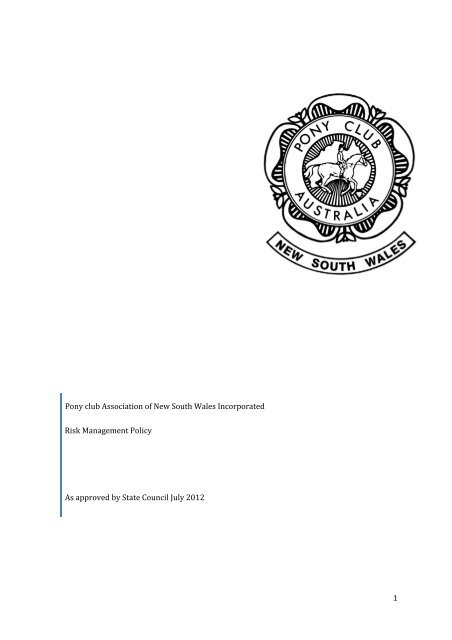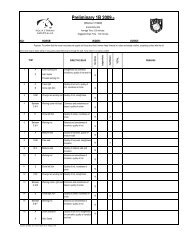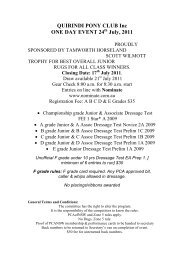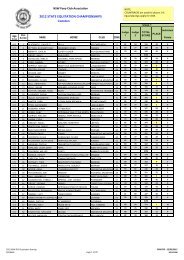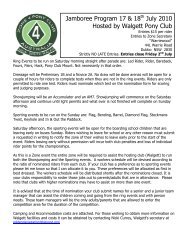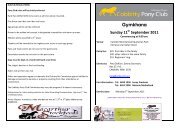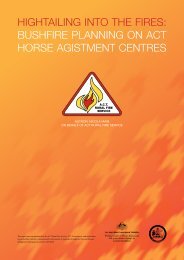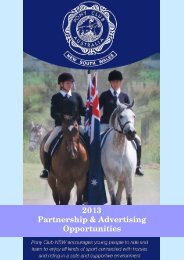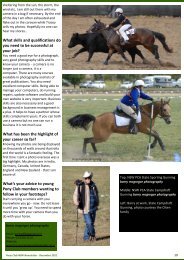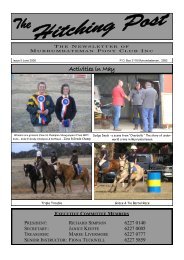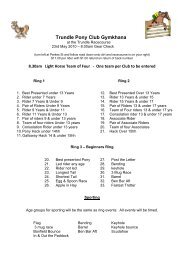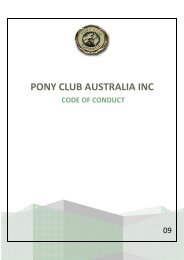Risk Management Policy - Pony Club Association of NSW
Risk Management Policy - Pony Club Association of NSW
Risk Management Policy - Pony Club Association of NSW
You also want an ePaper? Increase the reach of your titles
YUMPU automatically turns print PDFs into web optimized ePapers that Google loves.
<strong>Pony</strong> club <strong>Association</strong> <strong>of</strong> New South Wales Incorporated<strong>Risk</strong> <strong>Management</strong> <strong>Policy</strong>As approved by State Council July 20121
TABLE OF CONTENTS1. RISK MANAGEMENT 31.1 What is <strong>Risk</strong> <strong>Management</strong>? 31.2 What is it for? 31.3 <strong>Policy</strong> Review 31.4 <strong>Risk</strong> <strong>Management</strong> Officer/s or Safety Officers 41.5 Responsibility 42. WHO CAN CREATE A RISK? 4Obligations <strong>of</strong> Office Bearers 53. WHO MAY SUFFER A LOSS? 61. AREAS OF RISK 61.1 Negligence 64.2 Workplace Health & Safety 84.3 Award Entitlements 94.4 <strong>Association</strong>s Incorporation Act Requirements 94.5 Financial <strong>Risk</strong> 104.6 Defamation 114.7 Nuisance 114.8 Discrimination 124.9 Sponsorship 134.10 Selection and Event Rules 135. INSURANCE 146.0 RISK ASSESSMENT 15ANNEXURE A 16ANNEXURE B 19ANNEXURE C 20ANNEXURE D 20ANNEXURE E 21ANNEXURE F 232
<strong>Pony</strong> <strong>Club</strong> <strong>Association</strong> <strong>NSW</strong> and Associated <strong>Club</strong>s and/or ZonesRISK MANAGEMENT POLICYThis <strong>Policy</strong> is intended as a risk management program for <strong>Pony</strong> <strong>Club</strong> <strong>Association</strong> <strong>NSW</strong> andIndividual <strong>Pony</strong> <strong>Club</strong>s/Zones.1. RISK MANAGEMENT1.1 What is <strong>Risk</strong> <strong>Management</strong>?<strong>Risk</strong> management involves minimising risks facing PONY CLUB, affiliated clubs and theirmembers (collectively referred to as the Sport), whether appearing in the form <strong>of</strong> financial lossor physical injury or damage or abuse.It includes a number <strong>of</strong> steps summarised as follows:‐ Identifying risks which threaten the wellbeing <strong>of</strong> the Sport;‐ Assessing the importance <strong>of</strong> those risks and the consequences to the Sport if they areignored. The focus generally is on safety issues and minimising potential litigation;‐ Designing a process to eliminate or minimise those risks;‐ Taking all possible steps to comply with that process; and‐ Constantly reviewing the process so that it can be improved and grow to suit the needs<strong>of</strong> the sport.1.2 What is it for?If risks are not controlled, a number <strong>of</strong> potential consequences flow from those risks. Inparticular, the Sport or a section <strong>of</strong> it must consider the following:‐ Extensive financial liability may have to be met by the Sport, limiting the funds that canbe channelled directly into its true purposes;‐ Physical injury or abuse or financial loss may be suffered by riders, instructors,stewards, judges, <strong>of</strong>ficers, volunteers or the public if proper attention is not given;‐ Limiting costs by minimising insurance premiums;‐ The reputation <strong>of</strong> the Sport may suffer if safety and accountability are not observed‐ It is now a condition <strong>of</strong> State Government funding that a suitable risk managementstrategy operates and inactivity may deprive the Sport <strong>of</strong> significant contributions; and‐ PONY CLUB, affiliated clubs and/or its members and <strong>of</strong>ficials may be sued or fined forfailing to comply with various legal obligations.1.3 <strong>Policy</strong> ReviewA policy governing the broad range <strong>of</strong> risks facing PONY CLUB, affiliated clubs and associationscannot be written in stone. As it is implemented, it will become apparent that some processesare manageable while others require variation to suit particular circumstances.It is imperative that all people responsible for complying with the policy are turning their mindsto ways in which activities in their domain could be improved. This applies to <strong>of</strong>ficials,instructors, riders, stewards, judges, <strong>of</strong>ficials, employees, contractors, PONY CLUB and affiliatedclubs as a whole.This policy should not be a document which states appropriate guidelines for all time. As newrisks are identified they should be reported and, if necessary, the policy should be reviewed andrevised.3
1.4 <strong>Risk</strong> <strong>Management</strong> Officer/s or Safety OfficersA <strong>Risk</strong> <strong>Management</strong> Officer (RMO) may be appointed on behalf <strong>of</strong> PONY CLUB, and eachaffiliated club/zone or association to be responsible for acting as the control point for the policy.Until an RMO is appointed the management committee <strong>of</strong> each club/zone is responsible for theimplementation <strong>of</strong> this policy. In the absence <strong>of</strong> an RMO the management committee will berequired to:‐ Where practical, prepare duty statements for each class <strong>of</strong> person providing services byor on behalf <strong>of</strong> PONY CLUB, affiliated clubs/zone or associations to supplement materialin Annexure "C" where required;‐ Where practical, prepare procedure manuals or checklists to set out the appropriatesteps to be followed in complying with this policy’s requirements to supplementmaterial in Annexure "C" where required.‐ Take steps to find out whether PONY CLUB or the affiliated club/zone or associationcomplies with the agreed policy. The checklist at Annexure A will assist this process;‐ Make enquiries and receive feedback from people involved in implementing the policyto find out whether change is desirable; and‐ Report any developments to the management committee to ensure that it is advised <strong>of</strong>the policy status and operation.‐ Each affiliated club/zone and association should appoint its own RMO, who will liaisewith PONY CLUB ASSOCIATION SNW’s RMO on issues <strong>of</strong> policy and procedure. Until anRMO is appointed the management committee <strong>of</strong> the affiliated club/zone or associationis responsible for the implementation <strong>of</strong> this policy.All affiliated clubs/zones should complete the checklist (Annexure A) and return it to ThePCA <strong>NSW</strong> RMO no later than 31st March in each year.1.5 ResponsibilityWhile the RMO is specifically nominated to oversee the implementation and direction <strong>of</strong> thepolicy, that does not relieve all others <strong>of</strong> responsibility for risk management. It is vital that allaffiliated clubs/zones and associations, members, riders, instructors, stewards, judges, <strong>of</strong>ficersand agents <strong>of</strong> PONY CLUB understand their role in complying with aspects <strong>of</strong> the policy whichrelate to them. Because they are the people carrying out the policy on a day to day basis, theyare also the people best placed to identify problems with it and recommend a range <strong>of</strong>improvements.People in all <strong>of</strong> these categories have the ability to cause injury or loss through a failure toappreciate and avoid risks. In the interests <strong>of</strong> PONY CLUB, affiliated clubs/zones andassociations and its members, it is vital that they understand their responsibilities under thispolicy.2. WHO CAN CREATE A RISK?The following people might cause loss or injury by failing to take steps to avoid risk:Officers, stewards and judges <strong>of</strong> PONY CLUB, affiliated clubs/zones and associations;Riders/participants, members;Instructors;Agents <strong>of</strong> the Sport (i.e. employees, contractors, coaches, doctors, volunteers);Affiliated clubs/zones; and<strong>Management</strong> committee/s (including sub‐committees).4
The risks identified in this policy do not necessarily affect each and every category directly. Thetable below sets out the areas in which each class <strong>of</strong> person must direct their attention as fallingwithin their responsibility.Who can create a risk?Description <strong>of</strong><strong>Risk</strong>Officers/Judge Riders/ParticipantsAgents <strong>Club</strong>/Affiliate<strong>Management</strong>CommitteeStewards/InstructorsMembers Bodies OfficeBearersNegligence Workplace Heath SafetyActrequirementsCommission for Children &Young PeopleregulationsAwardEntitlements<strong>Association</strong>sIncorporationsAct (®ulatoryrequirements)Contractual obligationsDefamation Nuisance Discrimination Insurance Sponsorship Obligations <strong>of</strong> Office BearersOfficers <strong>of</strong> PONY CLUB, affiliated clubs/zones and associations are obliged both under generallaw and by statute to observe certain standards in carrying out their duties asexecutive/directors.A failure to comply with these minimum standards may expose the <strong>of</strong>ficer to a broad range <strong>of</strong>claims by PONY CLUB, affiliated clubs/zones and associations or other people suffering loss.The general law requires an executive/director to take reasonable care in carrying out hisfunctions, taking into account the executive/director’s skill, knowledge and experience. Theexecutive/director must also act honestly, taking care to avoid conflicts between the duty toPONY CLUB, affiliated club/zone or association and either duties to other organisations orpersonal interest.The Corporations Law imposes similar concurrent obligations which allow for a civil penalty tobe imposed when they are breached.5
PONY CLUB, affiliated clubs/zones and associations is/are entitled to claim against an <strong>of</strong>ficerwho has breached one <strong>of</strong> these duties for any gain made by the <strong>of</strong>ficer or loss suffered by PONYCLUB an affiliated club/zone or association as a result.There is a misconception that <strong>of</strong>ficers are free from liability if PONY CLUB, the affiliated club/zoneor association has been incorporated. This is clearly not the case and an <strong>of</strong>ficer may still be heldresponsible for some liabilities. Officers should read and understand Annexure B onexecutive/directors’ duties before taking up <strong>of</strong>fice.3. WHO MAY SUFFER A LOSS?The Sport can be liable to a wide range <strong>of</strong> people or organisations. Many <strong>of</strong> those capable <strong>of</strong>causing loss are also susceptible to suffering a loss. That loss, in many cases, can be sheetedhome to the Sport because <strong>of</strong> a failure to manage the risk. That range includes the following:Riders/participants, members;Instructors, coaches;Agents <strong>of</strong> the Sport;Stewards, judges or <strong>of</strong>ficers;Members <strong>of</strong> the public;Affiliated clubs/zones and associations.So far as these types <strong>of</strong> people or organisations are concerned, the loss may be physical (in thesense <strong>of</strong> an injury or abuse) or may be financial (in the sense <strong>of</strong> causing that person some form<strong>of</strong> financial expense or loss <strong>of</strong> opportunity). There are also risks which may result in fines,penalties or cancellation <strong>of</strong> registration which are imposed because PONY CLUB, the affiliatedclub/zone or association fails to comply with an obligation imposed by law.The following topics set out areas <strong>of</strong> significant risk which may lead to loss or injury.1. AREAS OF RISK1.1 Negligence(a)<strong>Risk</strong>The purpose <strong>of</strong> this section is to minimise liability which results from PONY CLUB, an affiliatedclub/zone or association or one <strong>of</strong> its agents, stewards, judges, <strong>of</strong>ficials, or a rider, instructorfailing to take reasonable care to avoid foreseeable risks <strong>of</strong> injury to others. The result <strong>of</strong>negligent behaviour may be physical damage or injury or financial loss.(b)Managing the <strong>Risk</strong>Foreseeable risks are apparent in a wide range <strong>of</strong> activities within the Sport. The principal rulefor all people at all times is to consider the potential consequences <strong>of</strong> any act or any failure toact. Riders should comply with the guidelines set out in the <strong>Pony</strong> <strong>Club</strong> Handbook or Manuals.Instructors should comply with the guidelines set out in the <strong>Pony</strong> <strong>Club</strong> Handbook or Manualsany PONY CLUB, affiliated club/zone or association Work Manuals for instructor Levels.Key areas which should be considered include:SUPERVISION – Where practical, the RMO shall establish a practice <strong>of</strong> requiring use <strong>of</strong> facilitiesto occur only with adequate supervision. In particular, instructors present at events or otheractivities run by the Sport should ensure that all facilities, equipment or other property at6
<strong>Association</strong> or affiliated club/zone premises are being used properly and in a manner whichminimises the risk <strong>of</strong> injury. Special attention should be given to young and/or inexperiencedriders who may be more likely to cause injury to themselves, other riders, onlookers, the publicor any personal property.In particular, the instructor should intervene if there is reason to suggest an unacceptable risk isbeing taken, i.e. use <strong>of</strong> an inappropriate horse or the taking <strong>of</strong> an unacceptable risk in view <strong>of</strong>the rider’s experience and ability. In cases where there is a risk but that risk is reasonable orinherent to that particular activity or exercise, the instructor should explain the risk to the riderand ensure that the risk is understood.As it is not practical to do so, the RMO is not obliged to notify persons in parental control whoare not in attendance at an event <strong>of</strong> the risks and dangers inherent in taking part in equestriansport or training. It is reasonable to expect that persons in parental control <strong>of</strong> riders inattendance at an event would be aware <strong>of</strong> the risks and dangers involved in equestrian sport ortraining.EVENT SAFETY – All participants involved in events or other activities run by PONY CLUB,affiliated clubs/zones and associations are entitled to expect that the event or activity isconducted in a safe manner and care will be taken for their safety. For the guidance <strong>of</strong> clubs, aguide to event safety is in Annexure C.All participants in events or other activities run by PONY CLUB, affiliated clubs and associationswill be required to sign a formal release (see Annexure D) releasing PONY CLUB, the affiliatedclubs/zones and associations from liability to the participant for loss or injury suffered. Themembership or participation <strong>of</strong> a rider who is not prepared to sign the release should berefused.MEDICAL TREATMENT – Where reasonably practical, the RMO should ensure that all<strong>Association</strong> or club/zone riding activities are supported by proper medical facilities. This willinclude:‐1. A first aid kit maintained on the premises or if the activity is away from the premises;2. Where reasonably possible, a suitably qualified medical practitioner available at shortnotice in the case <strong>of</strong> serious emergency;3. The presence <strong>of</strong> a person, preferably an instructor, suitably qualified to administerfirst aid if required. Instructors should refer all injuries that are not <strong>of</strong> a minor nature toa qualified medical practitioner; and4. Facilities should be available at all venues for the purpose <strong>of</strong> contacting emergencyservices immediately.People other than qualified medical practitioners should not be administering drugs to riders orany other people.First aid kits should be regularly checked and be easily accessible in the case <strong>of</strong> emergency.ACCESS WAYS – The RMO should ensure that there is adequate access to amenities shouldemergency services be required.TRAVEL – When riders, instructors or <strong>of</strong>ficials travel together to venues as a team under theauthority <strong>of</strong> PONY CLUB, an affiliated club/zone or association, a supervisor/manager will beplaced in charge <strong>of</strong> the team and must be responsible for supervising/managing the conductand behaviour <strong>of</strong> the team members. The team members must comply with any direction orrequest <strong>of</strong> the supervisor/manager to ensure that all risks or injury or property damage to teammembers or the public are avoided.7
strict and focuses less on the degree <strong>of</strong> care taken and more on the resulting safety <strong>of</strong> theworkplace. It also places an obligation on workers and on other people (including members,riders, instructors, stewards, judges, volunteers, the public) coming onto the workplace to actresponsibly and to comply with any instructions given.If a workplace is considered unsafe, a WorkCover inspector may issue a notice requiring theproblem to be rectified. If it is not rectified within the time specified in the notice, the occupiermay be prosecuted for the commission <strong>of</strong> an <strong>of</strong>fence. However, even if the workplace has notbeen reviewed by an inspector and an injury is suffered because <strong>of</strong> an unsafe work practice, aprosecution may result automatically.(b)Managing <strong>of</strong> the <strong>Risk</strong>Because PONY CLUB, affiliated clubs/zones and associations can be fined for breach <strong>of</strong> theirobligations, it is important that all areas be assessed and reviewed under the authority <strong>of</strong> theRMO in the context <strong>of</strong> precautions under the “Area <strong>of</strong> <strong>Risk</strong> – Negligence” section above.Unlike negligence, a WorkCover fine is essentially a criminal prosecution for which insurancemay not extend. For this reason, it is even more important that these initiatives be observed.Instructors in the employ <strong>of</strong> PONY CLUB, affiliated clubs/zones or associations or acting on avoluntary basis must have a minimum Equestrian Australia NCAS Level One or higherqualification and are required to comply with the guidelines contained in Annexure C.4.3 Award Entitlements(a) <strong>Risk</strong>The purpose <strong>of</strong> this section is to avoid liability arising out <strong>of</strong> a failure to comply with industrialawards. There is a strong probability that a number <strong>of</strong> employees (not being managerialemployees) <strong>of</strong> PONY CLUB, affiliated clubs/zones or associations are governed by one or moreindustrial awards.These awards are determined by the Industrial Relations Commission and set minimumstandards for employers to comply with in relation to wages, hours <strong>of</strong> work, leave, overtime andallowances. A failure to comply with award entitlements may leave PONY CLUB, an affiliatedclub/zone or association liable to:‐ Pay entitlements owing, which may relate to significant sums <strong>of</strong> money built up overalllong period; and/or‐ Prosecution for breach <strong>of</strong> the award.(b)Managing the <strong>Risk</strong>Enquiries should be made under the authority <strong>of</strong> the RMO to determine any applicable awardsand their minimum entitlements. Those enquiries can be carried out by obtaining legal advice orcontacting the Department <strong>of</strong> Education, Training and Industrial Relations.4.4 <strong>Association</strong>s Incorporation Act Requirements(a) <strong>Risk</strong>The purpose <strong>of</strong> this section is to ensure that PONY CLUB, affiliated clubs/zones and associationsavoid statutory penalties and maintain their status under the relevant New South WalesGovernment Incorporation Act. If the incorporation is cancelled, PONY CLUB, an affiliatedclub/zone or association loses the benefits which flow from holding corporate status.9
(b)Managing the <strong>Risk</strong>It is important to ensure that PONY CLUB, affiliated clubs/zones and associations:‐ Limit operations to stated objects;‐ Refrain from any activities which are contrary to the public interest;‐ Through the relevant management committees comply with all accounting, recordkeeping, audit and statement obligations each financial year; and‐ Hold an annual general meeting within three months after the previous financial yearends.Failure to comply on any occasion will not automatically place incorporation at risk.However, discretion to take action rests with the Chief Executive Officer under the act and it isprudent to avoid placing PONY CLUB, affiliated clubs/zones and associations in unnecessaryjeopardy.4.5 Financial <strong>Risk</strong>(a) <strong>Risk</strong>This section is designed to safeguard against extensive financial commitment on the part <strong>of</strong>PONY CLUB, affiliated clubs/zones or associations as a result <strong>of</strong> the acts <strong>of</strong> an <strong>of</strong>ficer or agent.An <strong>of</strong>ficer or agent may place himself in a position to represent that he has the authority <strong>of</strong>PONY CLUB, an affiliate club/zone or association and enter into arrangements with third partiesin terms <strong>of</strong> sponsorship, supplies <strong>of</strong> goods, supply <strong>of</strong> equipment, consulting or servicearrangements.Provided that it is reasonable for the third party to assume that PONY CLUB or the affiliatedclub/zone or association has authorised the arrangement, a binding arrangement at the agreedprice is reached.(b)Managing the <strong>Risk</strong>Funds <strong>of</strong> PONY CLUB will be held in an account at a Bank nominated by the <strong>Management</strong>Committee, under the authority <strong>of</strong> the treasurer and the elected <strong>of</strong>fice bearers who will have theauthority to draw from the account and sign cheques/or operate electronically on behalf <strong>of</strong>PONY CLUB. The treasurer will also be responsible for maintaining books <strong>of</strong> account and otherfinancial records <strong>of</strong> PONY CLUB, which be audited as required by the club/zone constitution orrules and a report presented to the management committee meeting. Affiliated clubs/zones andassociations should adopt similar practices appropriate to their constitutions.In many cases, PONY CLUB, affiliated clubs/zones and associations will enter into arrangementswith third parties that do not involve large sums <strong>of</strong> money.Commitments that are not <strong>of</strong> a serious nature are unlikely to upset the financial viability <strong>of</strong>PONY CLUB, the affiliated club/zone or association. To require formal approval on each <strong>of</strong> thoseoccasions would result in administrative inconvenience.However, for arrangements having a value in excess <strong>of</strong> $100 or which, regardless <strong>of</strong> value, relateto sponsorships or employing staff, no person must represent that they have the authority tobind PONY CLUB, the affiliated club/zone or association without the formal approval <strong>of</strong> themanagement committee.10
4.6 Defamation(a) <strong>Risk</strong>The purpose <strong>of</strong> this section is to avoid liability arising out <strong>of</strong> written or spoken statements madeby or on behalf <strong>of</strong> PONY CLUB, an affiliated club/zone or association or by any <strong>of</strong> their agents.A statement will be defamatory if it is published to another person (whether that is in private, ata public meeting or to a journalist) and is likely to injure somebody’s reputation or their tradeor pr<strong>of</strong>ession or is likely to cause others to shun, avoid, ridicule or despise them.If a statement is made that falls within this definition, and the person making the statementdoes so in their capacity as an <strong>of</strong>ficer or representative <strong>of</strong> PONY CLUB or an affiliated club/zoneor association, the person whose reputation is injured may bring a claim against both the maker<strong>of</strong> the statement and PONY CLUB, the affiliated club/zone and/or association to obtaincompensation.(b)Managing the <strong>Risk</strong>The best means <strong>of</strong> avoiding the risk is to say nothing that is ever likely to affect another’sreputation in a negative way. That may not always be realistic and the law recognises a number<strong>of</strong> situations where these types <strong>of</strong> statements are acceptable.If a statement is to be made, and it is intended to convey information or an opinion which iscritical <strong>of</strong> any person, the maker <strong>of</strong> the statement should consult at the very least with themanagement committee, who will assess whether legal advice should be taken.If a statement has been made without vetting it through the established procedure, it should bereported to the management committee so that steps can be taken to rectify the situation bytaking legal advice, issuing an apology or consulting with the aggrieved person.4.7 Nuisance(a) <strong>Risk</strong>The purpose <strong>of</strong> this section is to avoid repercussions from members <strong>of</strong> the public who arevictims <strong>of</strong> substantial and unreasonable interferences with enjoyment <strong>of</strong> their residences. Themost relevant interferences come from excessive noise levels, bright lighting, parking problemsor disrespect for private property.(b)Managing <strong>of</strong> the <strong>Risk</strong>Steps should be taken to ensure that where potential nuisances cannot be avoided, they can bereduced to manageable levels and imposed with suitable public relations.For example: Noise and lighting levels should be monitored at events which take place in suburban orresidential areas on a regular basis. The noise level should not exceed a volume which isadequate to serve its intended purpose.For a one‐<strong>of</strong>f event, it is prudent to provide information accessible to likelycomplainants through signage or advertising so that they will have maximum notice <strong>of</strong>any potential inconvenience. Also provide a contact phone number so that annoyancescan be nipped in the bud before they escalate.11
Control should be exercised over the levels <strong>of</strong> alcohol (if any) consumed at authorisedevents. Care should be taken to ensure that the risk <strong>of</strong> patrons overindulging isminimised and, for larger events, some form <strong>of</strong> security to control unruly patrons isadvisable. Ensure that the PONY CLUB Alcohol <strong>Policy</strong> is strictly enforced.Riders who may travel to and from events or activities <strong>of</strong> PONY CLUB, affiliatedclubs/zones or associations should take care to respect the privacy and property <strong>of</strong>residents or other road users along the particular route.4.8 Discrimination(a) <strong>Risk</strong>The purpose <strong>of</strong> this section is to prevent complaints being made against PONY CLUB, affiliatedclubs/zones and associations for unlawful discrimination or sexual harassment. PONY CLUB,affiliated clubs/zones and associations are obliged to ensure that neither they nor any <strong>of</strong> their<strong>of</strong>ficers or agents: Unlawfully discriminate against any employee or member; or Engage in sexual harassment <strong>of</strong> any personUnlawful discrimination will occur if a person is treated differently because <strong>of</strong> a particularcharacteristic including; Marital status; Sex; Pregnancy; Age; Race; Impairment; Religion; Political beliefIt is important that PONY CLUB, affiliated clubs/zones and associations take steps to eradicateany discrimination or harassment as they are deemed to be responsible for the acts <strong>of</strong> theiremployees or agents.Of some importance is the issue <strong>of</strong> disability. Singular treatment <strong>of</strong> some people with a disabilitywill be lawful if it is appropriate in the circumstances e.g. safety considerations may limitcertain activities if the impairment creates an unacceptable risk.(b)Managing the <strong>Risk</strong>All <strong>of</strong>ficials, employees and agents should be aware <strong>of</strong> the minimum requirements <strong>of</strong> antidiscriminationlegislation. As a general rule, decision makers should specifically assess whetherthey might be relying upon one <strong>of</strong> the specific criteria when making a decision. Those decisionsmay involve whether to grant or deny membership, select in a team, provide a benefit, impose apenalty, grant or deny access to a facility, employ or dismiss, allocate work or grant promotion.In many cases, discrimination may appear to be necessary for good reason and the legislationspecifically allows for exceptions. If there is any doubt about whether discrimination might betaking place, the matter should be referred to the management committee who will thendetermine whether to seek legal advice.No contact <strong>of</strong> an intimate or sexual nature may occur between instructors and riders withwhom they are associated in the course <strong>of</strong> instruction or competition.12
4.9 Sponsorship(a) <strong>Risk</strong>The purpose <strong>of</strong> this section is to limit conflict between PONY CLUB and affiliated clubs/zonesand associations due to their private sponsorship arrangements.Difficulties can arise if a affiliated club/zones sponsor is an industry competitor <strong>of</strong> an <strong>of</strong>ficialsponsor <strong>of</strong> PONY CLUB, placing the prospect <strong>of</strong> ongoing sponsorship at risk.(b)Managing the <strong>Risk</strong><strong>Club</strong>s/zones should be encouraged to consult with PONY CLUB before agreeing to a sponsorshipto determine whether the deal would cause any conflict with an existing arrangement.4.10 Selection and Event Rules1. <strong>Risk</strong>It is important that any selection criteria which have been advised to riders are observedwhenever teams are selected. The same can be said for the need to comply with specific eventrules set down by PONY CLUB, affiliated clubs/zones and associations.A failure to do so may expose PONY CLUB, affiliated clubs/zones or associations toembarrassment, internal dispute and potential litigation at the instigation <strong>of</strong> a disgruntled rider.Once a rider is advised that selection is to be based on certain criteria, he or she is entitled toexpect selection if those criteria are met.2. Managing <strong>of</strong> the <strong>Risk</strong>The most risk adverse means <strong>of</strong> avoiding liability in selection disputes is to refrain fromspecifying formal criteria and leaving the selection committee a broad discretion, which isexercised by looking at all factors which are relevant to selection. Factors which are irrelevantor improperly motivated should not be relied upon to exclude a rider deserving <strong>of</strong> selection.In some cases, the relevance <strong>of</strong> some considerations will not be clear in the circumstances. Onthose occasions, legal advice should be sought to establish the criteria which may enable a riderto be excluded from selection.INDIVIUAL PONY CLUB, affiliated clubs/zones and associations have established rules for:‐ Scoring;‐ Uniforms and saddlery;‐ Dressage;‐ Showjumping;‐ Polocrosse;‐ Jumping Equitation;‐ Eventing;‐ Sporting;‐ Campdraft; and‐ Mounted GamesAll people involved in events governed by formal rules must comply with those rules.13
Any problem with the operation <strong>of</strong> rules should be brought to the attention <strong>of</strong> the appropriateperson, the appropriate discipline sub‐committee or the management committee in accordancewith competition and administration rules as provided in Annexure C.5. INSURANCE5.1 RelevanceThe purpose <strong>of</strong> this section is to provide an effective protection against liability when;‐ The risk management procedures fail; or‐ An unforeseen event occurs, which causes loss or damage to another.Insurance should always be regarded as a last resort. Maintaining comprehensive insurance isnot an appropriate substitute for a properly implemented risk management plan. This isbecause;‐ Not all risks are insurable or fully insurable and coverage might be denied in certaincases; and‐ <strong>Risk</strong> prone sports making numerous claims (or a small number <strong>of</strong> high value claims)eventually will find insurance premiums to be prohibitively expensive putting at risk thefinancial viability <strong>of</strong> the sport.5.2 Appropriate policy coverageAlthough not all risks are insurable, policies should be held (and complied with fully) by PONYCLUB (and, where appropriate, affiliated clubs/zones and associations) in the following areas:(a)Workers’ CompensationEmployers are obliged by law to maintain a workers’ compensation policy for all paidemployees. The insurer is CGU and the policy will extend to all work related illnesses andinjuries.(b)Public Liability InsuranceA policy should be maintained covering the liability for compensation relating to personal injuryor property damage caused by members, instructors, volunteers, PONY CLUB, affiliatedclubs/zones and associations. It is important regularly to review the scope <strong>of</strong> the insurance tomake certain that all potential contingencies are covered, with particular references to thescope <strong>of</strong> the activities <strong>of</strong> PONY CLUB, affiliated clubs/zones and associations.(c) Directors and Officers Liability and Pr<strong>of</strong>essional Indemnity InsurancePolicies should be maintained to indemnify for loss arising from acts or omissions <strong>of</strong> <strong>of</strong>ficers <strong>of</strong>PONY CLUB and affiliated bodies, including management committee members, instructingjudges, stewards, or other <strong>of</strong>ficers.(d) Accident InsuranceA policy should be maintained to provide compensation for loss suffered by riders duringperformance which does not result from any negligent act or omission, but arises simply fromthe inherent risks in active participation. This is particularly important in a potentiallyhazardous activity such as horse riding.(e) Motor Vehicle Insurance14
Any vehicles owned or used by PONY CLUB, affiliated clubs/zones and associations should beRegistered with New South Wales Roads and Traffic Authority, and in doing so, have a currentcompulsory third party insurance policy for personal injury caused by it. There should also be apolicy <strong>of</strong> third party property damage to cover liability to compensate for physical loss otherthan personal injury. In the case <strong>of</strong> expensive vehicles, consideration should be given to acomprehensive policy that allows the owner to claim for damage sustained to the vehicle,whether through negligence or otherwise.The RMO must undertake a review <strong>of</strong> the insurance policies maintained by PONY CLUB,affiliated clubs/zones or associations. The review will occur annually or from time to time ifthere is a change in the circumstances <strong>of</strong> PONY CLUB, the affiliated club/zone or associationindicating a need for broader coverage. Regard should be given to the areas covered by thepolicies and the maximum levels <strong>of</strong> coverage for each type <strong>of</strong> claim.6.0 RISK ASSESSMENT6.1 Quick Guide to Assessing <strong>Risk</strong><strong>Risk</strong> can be influenced by two main factors:‐ The likelihood <strong>of</strong> it actually occurring, and‐ The extremity <strong>of</strong> the consequences if it did occurThese two factors are given values or weights. These are added together to calculate the Degree<strong>of</strong> <strong>Risk</strong>.The Degree <strong>of</strong> <strong>Risk</strong> is compared against either the Colour coded Matrix or the table on the RISKASSESSMENT MATRIX to determine the best method <strong>of</strong> dealing with that particular risk.<strong>Risk</strong> Degree <strong>of</strong> Colour code on How to manage the riskWeight <strong>Risk</strong> chartLess than5Low Green Should be capable <strong>of</strong> being managed by simpleroutine instructions.5 Medium Light Yellow A special <strong>Management</strong> Responsibility should beallocated to manage his risk.6 to 7 High Bright Yellow Should be managed by Senior or Specialists<strong>Management</strong>.Over 7 Extreme Red A detailed Action Plan and review mechanismshould be put in place to manage this risk.15
ANNEXURE ACHECKLIST FOR CLUBS – Warning: this checklist is not exhaustiveAll associations and clubs/zones affiliated with PONY CLUB should complete the followingchecklist and return it to the PONY CLUB RMO by 31st March each year.If the answer to any <strong>of</strong> the questions is “no”, please provide details explaining the reason fornon‐compliance and the action and timeframe in place to remedy the non‐compliance.CLUB, ZONE OR ASSOCIATION NAMEINDVIDUAL PONY CLUBNumber Question Answer If an answer is “no” isexplanation attached.1 Is a copy <strong>of</strong> the following documentsdisplayed in a place available to allmembers, riders, volunteers,instructors and staff?Yes No Yes No1. <strong>Club</strong> Constitution or Rules2. <strong>Club</strong> By‐laws3. <strong>Club</strong> <strong>Risk</strong> <strong>Management</strong> <strong>Policy</strong>4. <strong>Club</strong> Members Protection <strong>Policy</strong>5. PCA <strong>NSW</strong> Certificate <strong>of</strong> Currency6. <strong>Association</strong>s Incorporations Act andRegulations including Model Rules7. Copies <strong>of</strong> DFT Annual Return8. Copies <strong>of</strong> PCA<strong>NSW</strong> Annual Return9. Copies <strong>of</strong> AGM Minutes2 Has the club reviewed the followingpolicies and made any recommendedchanges in the past twelve months?1. <strong>Risk</strong> <strong>Management</strong> <strong>Policy</strong>Date <strong>of</strong> reviewYes/ /20No/ /20YesNo2. Member Protection <strong>Policy</strong>Date <strong>of</strong> review/ /20/ /203. By‐lawsDate <strong>of</strong> review/ /20/ /2016
3 Has the club complied with the policy inrelation to inspection and maintenance<strong>of</strong> facilities?Date <strong>of</strong> last inspection4 Has the club complied with the policy inrelation to the provision <strong>of</strong> food andbeverages?Date <strong>of</strong> last inspection.Yes//20Yes//20No Yes NoNo Yes No5 Is ready access to and from facilitiesavailable in the event <strong>of</strong> an emergency?6 Does the club ensure that there isappropriate supervision andmonitoring <strong>of</strong> the use <strong>of</strong> club facilities?7 Has the club complied with the policy inrelation to medical treatment, both inrelation to skills and facilities?Yes No Yes NoYes No Yes NoYes No Yes No8 Has the club’s legal advisor confirmedthat the club’s Constitution is adequateto allow for the exercise disciplinarypowers over its members?Date <strong>of</strong> last review9 Do club premises comply with theminimum Workplace health and safetystandards?Date <strong>of</strong> last review10 Are all employees receiving their fullaward entitlements?Date <strong>of</strong> last reviewYes/ /20Yes/ /20Yes/ /20No Yes NoNo Yes NoNo Yes No11 Has the club and its members compliedwith the <strong>Policy</strong> on defamation?Tick “no” if the club has received anycomplaints in this regard12 Has the club reviewed noised andlighting levels over the past twelvemonths to ensure they are notexcessive?Yes No Yes NoYes No Yes No17
Date <strong>of</strong> last review //2013 Has the club complied with the policyon discrimination?14 Has the club ensured that all membersare notified to PCA<strong>NSW</strong> and aretherefore covered under the PCA<strong>NSW</strong>insurance?15 Has the club considered the relevantrule book or manual when running andevent or activity, regular or otherwise,for riders?16 Is there a prohibition or monetary limiton expenditure incurred by club<strong>of</strong>ficers or other without formalapproval?Yes No Yes NoYes No Yes NoYes No Yes NoYes No Yes No17 Must all cheques bear two signatures? Yes No Yes No18 Have up to date financial accounts beenpresented at each <strong>Management</strong>Committee Meeting during the last 12months?19 Has the <strong>Management</strong> Committee metduring the last 12 months as and whenrequired by the club constitution?20 Was the AGM held within 3 months <strong>of</strong>the end <strong>of</strong> the club’s financial year?Yes No Yes NoYes No Yes NoYes No Yes No2122SignatureName <strong>of</strong> person signing the reportPosition in organisationDateSignature18
ANNEXURE BLIABILITY OF DIRECTORS AND COMMITTEE MEMBERS OF SPORTINGORGANISATIONS – A GENERAL SUMMARYTo comply with this policy, and to minimise personal risk to Officers, all clubs/zones must beincorporated, however, it is incorrect to say that Directors or Officers <strong>of</strong> incorporated sportingorganisations will not be liable for any <strong>of</strong> their decisions.The law imposes certain obligations and duties upon <strong>of</strong>fice bearers, including:‐ They must act in good faith, in an honest manner and in the best interests <strong>of</strong> theCompany/<strong>Association</strong> and the members.‐ They must use due care and diligence in carrying out the functions <strong>of</strong> the <strong>of</strong>fice and inapplying powers associated with that <strong>of</strong>fice.‐ They must not take improper advantage <strong>of</strong> their <strong>of</strong>fice.‐ Should they in the course <strong>of</strong> their duties on the Board/<strong>Management</strong> Committee, receiveinformation <strong>of</strong> a confidential nature relevant to the Company/<strong>Association</strong>, then it is seento be improper to disclose this information or allow it to be disclosed unless disclosurehas been authorised by the Company/<strong>Association</strong>.‐ They must not allow personal interests, or the interests <strong>of</strong> Individual members, toconflict with the interests <strong>of</strong> the Company/<strong>Association</strong>.‐ They have an obligation to behave in an independent manner and to take reasonablesteps to satisfy themselves as to the soundness <strong>of</strong> the decisions made and action takenby the Board/<strong>Management</strong> Committee.‐ They must not engage in conduct that may discredit the Company/<strong>Association</strong> in anyway.‐ They have an obligation to comply with the spirit <strong>of</strong> as well as the principles <strong>of</strong>Corporation Law and the constitution <strong>of</strong> the Company/<strong>Association</strong>.‐ They must make every effort to attend all Board/<strong>Management</strong> Committee meetings andonly where not possible appoint an alternate director to act in their place. Should theyregularly find themselves unable to attend meetings they should consider resigningfrom their position.If an <strong>of</strong>fice bearer is in breach <strong>of</strong> these duties, he or she may be liable to the organisation orothers for any loss or damage suffered as a result <strong>of</strong> the breach.If you do not understand these concepts, you should not act as a director or committee member.Insolvent TradingOfficers who fail to prevent organisations from incurring debts when there are reasonablegrounds for suspecting that the organisation is insolvent are personally liable for those debtswhere:‐ The <strong>of</strong>ficer was aware <strong>of</strong> those grounds; or‐ A reasonable person in like circumstances would have been aware <strong>of</strong> those grounds.All <strong>of</strong>ficers should monitor the financial performance and liabilities <strong>of</strong> the organisation at alltimes. If you are only a “volunteer” director, you will not be saved from liability by your statusor your ignorance. If you are not prepared to fully monitor financial performance, you shouldnot be a director or committee member.19
NegligenceJust because an organisation is incorporated does not mean that its <strong>of</strong>ficers are absolved fromclaims in negligence. If the <strong>of</strong>ficer is negligent, he or she can be sued even if PONY CLUB, theaffiliated club/zone or association can also be sued or if PONY CLUB, the affiliated club/zone orassociation is insured. The rules <strong>of</strong> PONY CLUB, the affiliated club/zone or association mayprovide for the <strong>of</strong>ficer to be indemnified in certain circumstances but this does not mean that anegligence claim cannot be made.Insurance may not cover these potential liabilities adequately or at all. The best “insurance” is:‐ The implementation <strong>of</strong> comprehensive risk management practices applicable to eachparticular situation; and‐ Only to accept the <strong>of</strong>fice <strong>of</strong> director or committee member if you fully understand theduties <strong>of</strong> that <strong>of</strong>fice and are prepared to discharge them.Administration HandbookRules for ShowjumpingRules for DressageRules for Sporting and CampdraftRules for Jumping EquitationRules for EventingRules for PolocrosseMounted Games Rule BookUniform and Gear Check ManualScoring Handbook<strong>Pony</strong> <strong>Club</strong> Manual No. 1.<strong>Pony</strong> <strong>Club</strong> Manual No. 2.ANNEXURE CANNEXURE D<strong>Risk</strong> Warning under 18 years <strong>of</strong> age<strong>Risk</strong> Warning over 18 years <strong>of</strong> age20
PARTICIPANT'S AGREEMENTANNEXURE E(Must be signed by all competitors)(For competitors under 18, a parent or guardian must sign.)WARNING: This is a legal document that affects your rights.I agree to participate in this event on the following basis:1. I acknowledge that competitive equestrian events involve the real risk injury, possiblyserious. This includes injuries related to or resulting from pre‐existing disabilities ormedical conditions.2. I understand that I should not participate in this event unless I have trainedappropriately and my physical condition has been verified by a medical practitioner.3. By participating, I accept all risks necessarily flowing from my participation which couldresult in loss <strong>of</strong> life, temporary or permanent injury. Accordingly, I release all peopleassociated with the conduct <strong>of</strong> the event from, and will indemnify them (to the extentmy actions are not excused or protected by law) against, all liability (including liabilityfor their negligence) for all injury, loss or damage arising out <strong>of</strong> or connected with myparticipation in this event. For clarification, the people released include eventorganisers, promoters, sponsors, managers, the <strong>Pony</strong> <strong>Club</strong> <strong>Association</strong> <strong>of</strong> <strong>NSW</strong> Inc andall <strong>of</strong> their respective directors, <strong>of</strong>ficers, employees, agents, contractors and volunteersincluding event medical and paramedical personnel. This release and indemnitycontinues forever and binds my heirs, executors, personal representatives and assigns.4. I consent to receiving any medical treatment that event organisers think desirableduring or after the event.5. I consent to event organisers using my name, image and likeness before, during or afterthe event, for event promotional, broadcasting or reporting purposes in any media.6. I understand that any insurance cover affected for participants may not cover me for anyor all injury, loss or damage sustained by me.7. I acknowledge that safety precautions undertaken by the Organiser (such as coursesupervision, safety briefings, animal inspections and equipment safety checks) are aservice to me and other competitors but are not a guarantee <strong>of</strong> safety.8. Animals are ridden by me at my risk. The Organiser is not responsible for injury, loss ordamage resulting from animal behaviour (including behaviour caused by the presence <strong>of</strong>other animals or participants). In particular, the Organiser is not responsible for animalselection on behalf <strong>of</strong> participants (for example, an animal may be unsuitable for aparticipant by reason <strong>of</strong> the participant’s inexperience or age).9. My registration is not transferable to other people. If I am unable to compete, or if theevent is cancelled, my registration fee is non‐refundable.10. I have listed below any medical or physical conditions from which I suffer that mightaffect my performance or be relevant if medical treatment is needed.11. I agree to abide by all race rules and directions issued by the event organiser.12. I certify that I am 18 years <strong>of</strong> age or older and I have read this document and fullyunderstand it._______________________________________________________________ Date: _________________________Signature21
(For participants under 18 years <strong>of</strong> age)As parent or guardian <strong>of</strong> the participant: _______________________________________________________________• I agree to the above for myself and on behalf <strong>of</strong> my child.• I indemnify and will keep indemnified the Organiser and all other people referred to above onthe terms referred to above._______________________________________________________________ Date: _________________________Parent/Guardian SignatureFull name: ___________________________________________________________________________________Medical conditions: _________________________________________________________________________________________________________________________________________________________________________________________________________________________________________________________________________________________________________________________________________________________________________22
ANNEXURE FSANCTION AGREEMENTPONY CLUB ASSOCIATION OF NEW SOUTH WALES INC(Authority)AND______________________________________________________________________________________________(Organiser)In consideration <strong>of</strong> PONY CLUB (Authority) considering this sanction application,Organiser and Authority agree as follows:1. Sanction is neither automatic nor irrevocable. Authority at its absolute discretion mayconditionally or unconditionally sanction, refuse to sanction, or withdraw its sanction <strong>of</strong>the event.For example, Authority might withhold or withdraw a sanction if it considers the event to riskcompetitor or public safety, to be unpr<strong>of</strong>essionally organised, to be financially under‐resourced,to breach Authority's rules or policies, or to be detrimental to the promotional or regulatoryinterests <strong>of</strong> Authority. Organiser has no claim against Authority in respect <strong>of</strong> any determinationmade by it.2. Authority reserves the right to change or amend its sanctioning policies, procedures andrequirements from time to time.3. If sanctioned, Organiser must comply with all rules and directions made by Authority inrespect <strong>of</strong> the conduct <strong>of</strong> this event and all conditions <strong>of</strong> any sanction conferred byAuthority, including rules regarding relevant safety standards and insurance. Failure tocomply with any <strong>of</strong> these rules, directions or conditions entitles Authority to (amongstother things) withdraw any sanction at any time.4. If sanctioned, Organiser must ensure that all participants in the event have signed a5. Participant's Agreement, in the form attached as Annexure F. A breach <strong>of</strong> this conditionwill be a breach <strong>of</strong> any sanction conferred by Authority, and entitles Authority towithdraw its sanction.6. Organiser must not:(a) make any alterations to the event premises or other event logistical or safetyarrangements; or(b) conduct an event other than in accordance with sanction conditions, without theprior written consent <strong>of</strong> Authority.7. If Authority declines to sanction the event or, having sanctioned the event, elects towithdraw its sanction for any reason, Organiser irrevocably authorises Authority topublish the fact, nature and reasons for its decision to decline or withdraw sanction toany person Authority thinks fit, including (but not limited to) prospective competitors,sponsors and the general public.8. It is Organiser's responsibility to conduct a safe and fair event. Any standards andconditions imposed by Authority for this event and events generally are minimalstandards only.9. Organiser acknowledges that:(a) an event is not necessarily safe or viable because it is sanctioned by Authority;(b) special or unusual conditions may require further precautions and actions in theinterests <strong>of</strong> competitor or spectator safety; and(c) public liability insurance cover and competitor race permit insurance coverarranged by Authority or required by Authority as a condition <strong>of</strong> sanction,although negotiated and arranged in good faith by Authority, might not cover all23
isks to Organiser or competitors associated with the event. Authority does notwarrant that the terms and coverage <strong>of</strong> any such insurance are adequate for thepurposes <strong>of</strong> Organiser or competitors and Organiser must satisfy itself that it isadequately insured.10. Organiser must not advertise the event as sanctioned unless and until Authority hassanctioned it and all conditions <strong>of</strong> sanction have been complied with. If Authoritywithdraws any sanction, Organiser must:(a) prior to the event, advise all competitors and prospective competitors <strong>of</strong>withdrawal <strong>of</strong> the sanction; and(b) remove any references to Authority's sanction from advertising or promotionalmaterial for the event.10. Organiser releases:(a) Authority; and(b) Authority's <strong>of</strong>ficers, directors, employees and agents in any way connected with thesanctioning process for or conduct <strong>of</strong> the event, from, and will indemnify them against,all claims, loss and liabilities (including claims in negligence against them) made orincurred by Organiser or any other person in respect <strong>of</strong> the conduct or sanctioning <strong>of</strong>the event, including for example (but not limited to):(i) personal or property damage to participants and spectators; and(ii) economic or other loss incurred by sponsors or others associated with theconduct or marketing <strong>of</strong> the event.DATED this day <strong>of</strong> 20__Full name or company name <strong>of</strong> Organiser: ____________________________________________Signed for and on behalf <strong>of</strong> Organiser by: _____________________________________________(Full name)24


